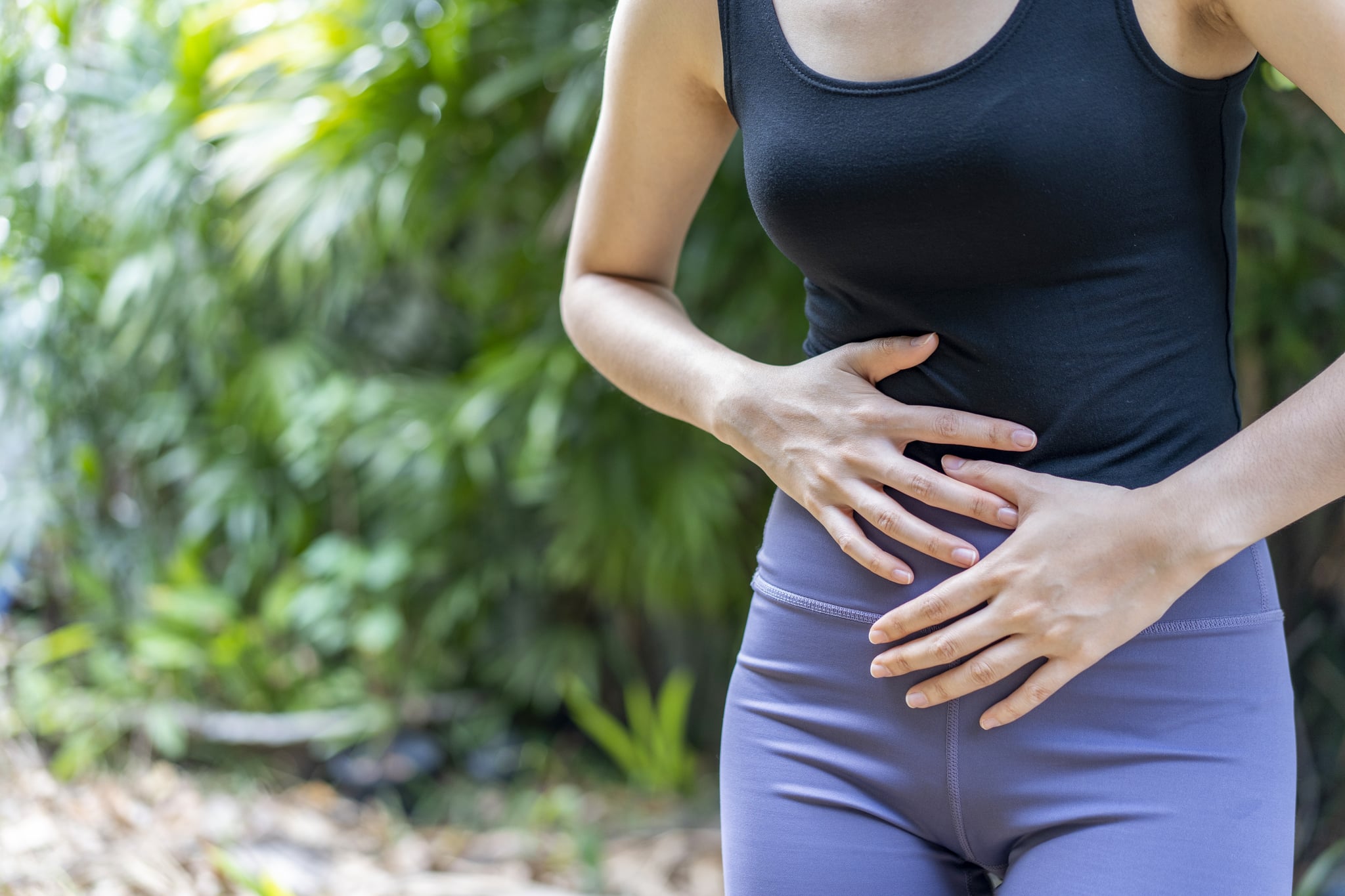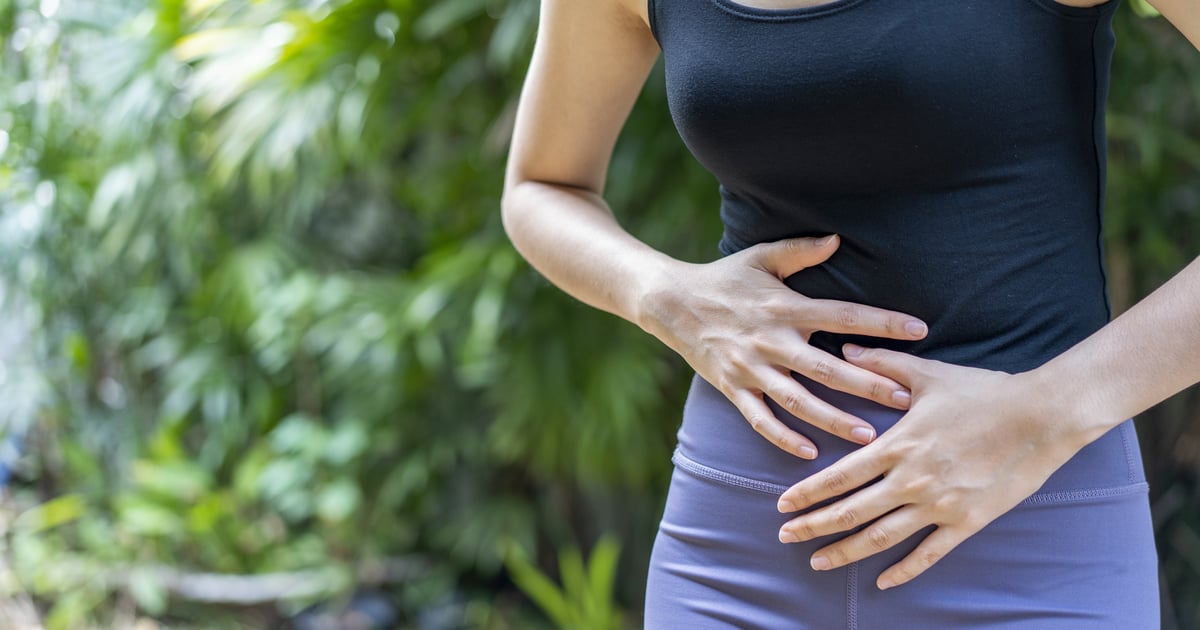
Have you ever felt or looked bloated after a workout and wondered why? Post-workout bloating is not fun, but it’s actually more common than you might think. In fact, it’s one of several common gastrointestinal issues that you might experience during or after a workout. “The incidence of overall exercise-induced gastrointestinal symptoms is anywhere from 20 to 96 percent,” board-certified Samantha Nazareth, MD, tells POPSUGAR, and these symptoms are especially common in women and younger people, studies have found. Those GI issues can include things like nausea, vomiting, and diarrhea — but what causes bloating after a workout, specifically? And most importantly, what can you do to manage and prevent it?
Bloating after a workout often has a lot to do with what and when you eat beforehand, but other factors can play a role, too, including hydration, exercise intensity, or even how hard you’re breathing (yes, really). The good news is that post-workout bloating is common and there are a few simple tweaks you can make to your routine to address it. Keep reading to learn everything you should know about post-workout bloating and how to treat it.
What Causes Bloating After a Workout?
Bloating after a workout tends to happen because when you’re exercising, your body can’t digest food as efficiently as it does when you’re at rest. “All things related to digestion are deprioritized when you are exercising,” Dr. Nazareth explains. So what might specifically be causing your bloating?
- Your body is digesting food. When you work out, your digestion process (aka gastric emptying, or the time it takes for food to empty your stomach) actually slows down as your body redirects blood flow to your muscles, Dr. Nazareth explains. Exercise-induced bloating, along with other GI symptoms, are sometimes simply related to this physiological fact, she says. Because of this, you might experience more intense GI symptoms, including bloating, if you’ve eaten a big or rich meal within a few hours of your workout. (More on that below.)
- You swallowed air while working out. Accidentally introducing air into your stomach, or aerophagia, can cause bloating. “In the case of working out, this can happen if you breathe heavily through your mouth,” Dr. Nazareth says. You may also experience it if you’re talking while eating or eating or drinking too quickly.
- You drank a carbonated or sugary sports drink. The carbonation in fizzy sports drinks can cause bloating by introducing gas to the stomach. Artificial sweeteners (such as sucralose or sugar alcohols) can also cause bloating, Dr. Nazareth notes.
- You’re dehydrated and/or constipated. Dehydration and loss of fluids is common during workouts and is a main cause of exercise-related GI symptoms, including constipation, according to research, and studies have found that constipation can lead to bloating. In other words, not drinking enough water before or during a workout may result in constipation and bloating afterward.
- You’re taking pain medication. Those painkillers you took for your sore muscles might be contributing to bloating symptoms. NSAIDs like ibuprofen, Motrin, Advil, or Aleve can irritate the gut, Dr. Nazareth says, and Cleveland Clinic notes that they may cause bloating, gas, stomach pain, and other GI issues. These issues usually crop up after large doses or frequent use.
- Your body isn’t used to intense activity: Whether you’ve just begun your fitness journey or you’re getting back into the swing of things, studies have found that strenuous endurance exercise can disrupt the balance of your gut microbiota, which can lead to bloating as well as cramps, nausea, and diarrhea.
Post-workout bloating may also be caused by conditions that aren’t related to exercise, such as small intestinal bacterial overgrowth (SIBO), digestive disorders like irritable bowel syndrome, or menstrual symptoms, according to Cleveland Clinic. If you regularly experience bloating, including after workouts, see a doctor to determine the cause.
How to Prevent Bloating After a Workout
There are a few things you can do to prevent post-workout bloating:
- Avoid eating a big meal before working out. Your digestive system isn’t running at full efficiency when you’re working out, so don’t tax it further with a big meal. Dr. Nazareth recommends avoiding high-calorie, high-fiber, and high-fat meals within two to three hours of exercise, since “these categories take the longest time to digest,” she explains. Instead, opt for a small amount of simple carbs such as fruit or bread if you need a pre-workout snack.
- Hydrate, but not too quickly, and avoid carbonation. You’ll want to drink water before and during your workout to avoid dehydration, but watch out for sports drinks that are carbonated or have artificial ingredients. Make sure to take small sips rather than gulping, which can cause you to swallow air and feel bloated.
- Try alternative painkillers. Frequently taking NSAIDs to deal with pain or inflammation might be causing your bloating. If this is the case, “talk to your doctor about possible alternatives,” Dr. Nazareth recommends.
- Build up to intense workouts. Highly strenuous exercise can be taxing on your digestive system and lead to bloating, especially if you’re not used to working out at that intensity. “You need time for your body to adjust,” Dr. Nazareth explains. Focus on building strength and endurance over time to avoid uncomfortable GI symptoms (and muscular and joint injuries!).
How to Reduce Bloating After a Workout
If you’re experiencing bloating after a workout, the good news is that it should pass quickly. To help reduce post-workout bloating, continue drinking water slowly and make sure to stretch and regulate your breathing, Dr. Nazareth says. Creating a wind-down routine, especially after an intense workout, helps to send a signal to your body that the time of stress is over, allowing it to start moving blood flow back to deprioritized areas like your digestive system.
If you’ve tried the prevention and reduction tips above but are still experiencing post-workout bloating, see a doctor to determine the cause of your symptoms and a plan to treat them. You should also see a doctor if you’re experiencing pain, vomiting, or heartburn during or after exercising.
